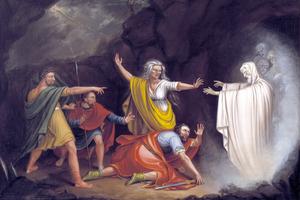God Exists — We Know This For a Fact
The Catholic Church teaches that the existence of God can be known — not just believed or held as an opinion.

Perhaps the most important question in the world is whether or not God exists. But most people, raised and trained well in the intellectual (or anti-intellectual) environment of our culture, when faced with this question, will respond, “Isn’t that just a matter of opinion?” No, it is not.
One of the common but detrimental ideas indoctrinated into us is the false dichotomy between fact and opinion, as I have written about elsewhere. The real dichotomies are between fact versus fiction (i.e. true versus false) and opinion versus knowledge. Opinion is just a low form of knowledge — an idea that someone thinks is true but cannot defend as knowledge. If someone can defend an idea from reason, experience or reliable authority, or any combination of those, then they can say that they know something is true.
The danger of the fact vs. opinion dichotomy is that whole classes of ideas are relegated to the garbage can of opinion — ideas that apparently are neither true nor false and which you can choose to believe or not. Minds deformed by this diseased way of thinking are quick to class anything other than science or math as “mere opinion,” which you are free to believe or not, but which have no bearing on reality. This is why statements about morality and religion are so often met with the reply, “Doesn’t that just depend on what you believe?”
No. Reality does not conform itself to our thoughts, and there are not separate realities for separate people. Jesus Christ really rose from the dead or he didn’t. Murder really is morally wrong or it is not. God either exists or he does not. Fact or fiction.
Knowing any of those statements to be true or false is the real question. Indeed, there are many truths that we cannot know because of the difficulty of the material or simple lack of time to investigate. Thankfully, Jesus entrusted the Church with the task of authoritative teaching, so each person does not have to be a scholar to produce his own understanding of religious truths — the most important questions that prod the heart and mind of mankind.
When it comes to the question about whether or not God exists, the biggest question that makes the biggest difference to our lives and outlooks on the world, the Church presents us with the truth that God exists. Yet, the Church also teaches that the knowledge of God’s existence can be reached without the aid of divine revelation (CCC 31-36). So, even if a man had never heard of any religion, he should be able to know that God exists.
It is to be emphasized that the Church is not teaching here that we can merely believe or have the opinion that God exists, or that we have to have blind faith that God exists, but that we can know it.
So, how is it possible to know? Because there are good arguments and even proofs for the existence of God. If someone knows why they know something, if they can defend their belief, then they can be said to know that thing. That idea, for them, is knowledge.
The arguments for God’s existence begin with direct and common experience. Philosophers throughout history, including some who were not religious (e.g. Plato, Aristotle, Plotinus), have laid out, expounded on and defended these arguments.
Some atheists have complained that if God wanted his existence to be known, he should have made it obvious. The testimony of the vast majority of cultures and thinkers throughout history demonstrates that he has made it obvious.
If you are wondering where you can find these arguments, three books come immediately to mind:
- Five Proofs of the Existence of God, by Edward Feser.
- Does God Exist?, by Matt Fradd and Robert Delfino.
- Handbook of Christian Apologetics, by Ronald Tacelli and Peter Kreeft.
All three books present multiple arguments for God’s existence as well as responses to common objections to the existence of God and those arguments. The Handbook of Christian Apologetics presents 20 arguments for God’s existence. The other two books each present five arguments and go into much greater depth and philosophical sophistication.
The alternatives to knowledge by argument are knowledge by reliable authority and by experience. Jesus Christ proved by his life, death and resurrection that he was God, and if we know that, then we can trust his authority. Also, you don’t have to defend your knowledge of what you yourself have experienced. When it comes to knowing God, that is the ultimate goal. It may not be something that can be logically convincing to others, but the testimony of our lives can, God willing, be evidence.
- Keywords:
- existence of god
- epistemology
- knowledge















